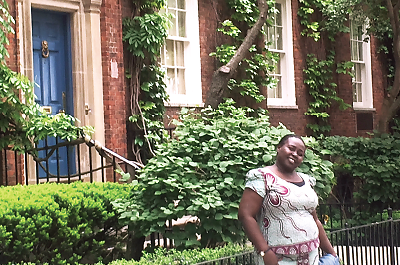Atong Ayel Longar Akol, M.D., is the director for mental health in South Sudan’s Ministry of Health. She also lectures at the University of Juba, where she is organizing its psychiatric curriculum, and serves as the mental health manager for GEMS Development Foundation, a nonprofit focused on ending hunger in South Sudan.
And, yes, she does clinical work, too.
Akol juggles all those hats because she is the only working psychiatrist in her country, which achieved independence in 2011. (One other South Sudanese psychiatrist no longer practices in the field, she said.)
Akol was interviewed in Atlanta, where she attended APA’s 2016 Annual Meeting and presented a talk titled “A Project for Mentally Ill Survivors in South Sudan: Transforming the Present, Shaping the Future.”
In South Sudan, a country of 12 million people, mental health resources are minimal, she said. There are just two psychiatric nurses in the country. Only 29 psychologists live there, but they are mainly academics, not clinicians. Akol is now training some of them to do clinical work. In addition, there is no regular funding for mental health services or medications.
Furthermore, South Sudan has no psychiatric hospital. One ward in the Juba teaching hospital holds only 12 psychiatric beds. Akol works there each day until 2 p.m. and then goes to her office at the Ministry of Health. In two other teaching hospitals, psychiatry is integrated into general medicine departments.
The main prison has an 80-bed ward for violent patients, where she visits them to diagnose their disorders and prescribe medications. “That treatment can shorten their stay in prison,” she said.
Originally, GEMS—the acronym stands for “Goats, Education, Medicine, Sustainability”—donated goats to families in rural areas to help end hunger and alleviate poverty. Now, Akol is expanding that mandate by developing a mental health program in Juba and supplying small quantities of medication to patients.
In the short term, said Akol, she seeks to expand the existing psychiatric ward at Juba Hospital, set up a 20-bed day care treatment center, develop a regular supply of medications, and encourage vocational and recreational therapies for patients.
She began a community outreach program in the cities of Juba and Wau and the state of Warrap that provide treatment to patients with severe mental illnesses or epilepsy. Many of these people were homeless or had been chained up by their families for want of better care, said Akol. The program served 300 patients in its first quarter (March to May 2015) and has expanded to care for 760 patients from December 2015, to February 2016.
Over the longer term, she hopes to develop national treatment guidelines, establish two or three psychiatric hospitals, expand training for mental health providers, and begin research on the efficacy of treatment programs.
She would like to add newer psychotropics to the national formulary, but there is a serious roadblock to their importation, she said: pharmaceutical companies won’t enter a market unless there are sufficient psychiatrists in the country to write prescriptions.
Given that, access to psychiatric medications is difficult, she said. Often, pharmacists buy medications from neighboring countries and resell them locally at high prices.
Cultural barriers to care exist as well. Akol is fighting a slow battle against the belief that mental illness is a curse or punishment and not a disease. As in other developing countries, one path to better understanding mental illnesses leads to the doors of practitioners of traditional medicine.
“People trust the traditional healers, so I want to start a community mental health clinic and try to train health workers there to work with traditional healers,” she said. “They would provide social support, but if a patient needs higher levels of care, they could refer them to the clinic,” she said.
Yet another hurdle is psychiatry’s stigmatized place within the medical profession in South Sudan, although Akol is working to change that. The medical school only recently introduced psychiatry into its curriculum, but there is still no residency program in the country. Akol did her residency in Khartoum, the capital of Sudan, the larger country from which South Sudan was carved in 2011.
“I believe better days are coming,” she said. “I am grateful for being a part of this year’s APA meeting.”
Already, members of APA’s Council on International Psychiatry have offered resources to help Akol plan her next steps for training, curriculum development, and new ideas for expanding the profession of psychiatry in her country.
“I say, don’t invest in South Sudan,” she said. “Invest in the South Sudanese people.”
However, her work has been at least temporarily interrupted by yet another flare-up of violence in fighting in South Sudan between the government and forces loyal to the country’s former vice president.
“We faced lots of challenges a few days ago, and most people have been displaced,” Akol told Psychiatric News in an email in mid-July. “The hospital is working although we have challenges with the manpower. I had to suspend my projects for two weeks as I help my family settle in Nairobi [in neighboring Kenya].” ■
The GEMS website can be accessed
here.

